- Home
- Sherry Thomas
The Hollow of Fear Page 10
The Hollow of Fear Read online
Page 10
Relief and gratitude inundated Mr. Walsh.
Briefly.
It was all well and good to send an ally, but this Mr. Holmes . . .
He was barely medium height and surprisingly portly for his age, which, despite his abundance of facial hair, couldn’t be more than twenty-five or twenty-six. Notwithstanding his rotundity, he was dressed nattily, his clothes of good material and superior workmanship. In fact, there was a great deal more than nattiness here: Mr. Holmes was dressed extravagantly.
The gold-and-sapphire-striped velvet waistcoat; the complicated, multi-tiered knot of the necktie; the boutonniere of three round, bright yellow craspedia flowers arranged against the iridescent eye of a peacock feather. From his watch fob hung an enamel peacock feather that matched the real one on his lapel. As he drew his watch out to check the time, he also extracted a monocle and screwed it into the socket of his right eye—a monocle the rim of which was actually, when Mr. Walsh looked closely, a serpent eating its own tail.
In his most desperate hour, Lord Ingram had received, for his only ally, a raging dandy.
“And you are just the person I wish to see, Mr. Walsh,” said the dandy. “I will need to speak to the outdoor staff first thing tomorrow—and will depend on you to take the arrangement in hand. But tonight, the indoor staff are my object.
“You will please send me, one by one, those who have already spoken to the police. Any lists you have of their names, ages, positions, et cetera, would be profoundly appreciated. I shall need to borrow a corner of the domestic offices, preferably a quiet and secluded one, to conduct these interviews. And if Mrs. Sanborn would kindly make ready a room on the nursery floor, so I will be out of the other guests’ way, she would have my eternal gratitude.”
Mr. Walsh blinked again. “Would that be all, Mr. Holmes?”
“I should like to take a quick look at his lordship’s and her ladyship’s apartments before I speak with your underlings. Would you be able to accompany me there?”
Mr. Walsh hesitated.
“Is Lord Ingram speaking to the police at the moment?” inquired Mr. Holmes.
“Yes.”
“If you need to, please ask him right now whether he will permit me into his rooms. Otherwise time is of the essence.”
Mr. Walsh acquiesced. The tour of Lord Ingram’s rooms was quick. That through Lady Ingram’s, even quicker.
When Mr. Holmes had taken a seat at Mr. Walsh’s desk and poured himself a cup of tea, he said, “By the way, even though Her Grace is more than capable of holding her own with His Grace, there’s no need to mention my presence to him or anyone he sends.”
“How should I tell the rest of the staff who you are, then?”
“You may say that I am a friend of Lord Ingram’s, here to do a friend’s duty.”
He smiled as he spoke, a rather ironic smile at that, but his tone was firm to the point of severity. Mr. Walsh took note: Mr. Holmes’s arrival in Stern Hollow was not to be breathed to anyone from Eastleigh Park.
“Do you think, Mr. Holmes, that anything we do can be of the slightest help to Lord Ingram?”
The question wiped the smile from Mr. Holmes’s face. He sighed. “It is not a good situation, Mr. Walsh. There will not be any direct evidence linking Lord Ingram to Lady Ingram’s death, but circumstantial evidence will be profuse and, almost without exception, unfavorable.”
Mr. Walsh swallowed.
Mr. Holmes looked him squarely in the eye. “But I am here, now. And I am his last, best hope.”
Eight
It was eleven o’clock at night when Charlotte finished speaking to the last of the indoor staff. She jotted down a few notes from the final interview and looked over the list of men and women to whom she had spoken.
Normally she wouldn’t need notes. But normally she did not meet forty strangers in a row.
A knock came at the door. “Enter,” she said, expecting Mr. Walsh, back to conduct her to her room.
Lord Ingram walked in. He looked drained. But as he saw her, a glimmer of light returned to his eyes.
She leaned back and crossed her arms in front of her chest, her elbows resting comfortably upon the padding that formed Sherrinford Holmes’s paunch. “Hullo, Ash.”
“I thought I heard the sound of cake disappearing from the—” He glanced at the tea tray, back at her, then at the tea tray again. “What is this? Did Mr. Walsh replenish the cake plates recently—or did you not touch anything?”
Sweet things placed before her usually disappeared: Hunger wasn’t necessary; cake tasted just as good accompanied by preoccupation, concern, or even boredom. The moment she’d read Livia’s letter, however, it was as if her stomach had turned into stone. The refreshments Mr. Walsh had laid out might as well have been made of wax, for all the interest they stirred in her.
But did she want Lord Ingram to know that—yet?
She covered half of her face. “You must not think, sir, that this is a common occurrence. I . . . I don’t know what happened. I assure you that the vast, vast majority of the time my appetite is as stiff as a flagpole and just as sizable. I am as shocked as you are by this inexplicable inability to perform.”
Different gradients of incredulity flickered across his face, as he no doubt tried to decide whether she truly was comparing her lack of appetite to an instance of impotence.
“Did you have a particularly plentiful tea at home?” he asked after a while.
He was not getting off the subject; she hadn’t thought he would, either. “My sister’s note came just as we sat down to tea. So . . . no.”
He peered at her, his brow furrowed. When he spoke again, his voice was low and tight. “Don’t tell me you last ate more than eight hours ago. You are scaring me.”
She exhaled. “You should be terrified. I am.”
She had gone into the village to hire a trap at the railway station to ferry her to Stern Hollow. And had stood outside the station for a quarter of an hour, not because there were no carriages to be had but because she needed to pull herself together.
He gripped the back of the chair behind which he stood. Two seconds later he let go. “Come. I told Mr. Walsh I would take you to your rooms. There’s supper waiting, too.”
She rose, rubbing a sore spot on her back, only to remember that her padding went all the way around. “You aren’t as good at feeding me as Lord Bancroft, but in a pinch, you’ll do.”
He gave her a severe look but did not dispute her claim.
Rooms had been assigned to her on the nursery level, as she’d requested—but they were nicer than she’d anticipated. Usually extra chambers this high up were seldom used and extremely plain, even in the grandest households. But hers was an apartment, sitting room, bedroom, dressing room, and its own attached bath and water closet.
“I used to stay here, when I came to visit my godfather. It suits Sherrinford Holmes’s purpose, I take it?”
“It does.”
“There’s a safe in the wall. I’ll give you the combination before I leave. And I’ve told Mrs. Sanborn that you hate disturbances in the morning. No maids are to come in to sweep the grate or relight the fire while you’re still sleeping.”
“Thank you.”
She half expected him to leave, but he only stared at her, leaning against the door. As the silence was about to become too taut, the corners of his lips quivered.
“I will have you know that Sherrinford Holmes cuts a dashing figure,” she protested. “Or at least he believes he does. And you will not go around injuring that poor man’s feelings.”
He cleared his throat. “I apologize.”
Immediately his lips quivered again. Then he burst out laughing—and kept laughing.
He had the most attractive laughter.
“Poor Sherry will never forgive you!”
But still he couldn’t
stop, until she sighed and ripped off both her mustache and beard.
He straightened and cleared his throat. “I do apologize.”
“You had better not do that when we are in front of other people.”
“I won’t.” He looked down for a moment. “Thank you.”
“You knew I would come.”
“I meant, thank you for your ridiculous yet sublime disguise. When I understood that I would most likely be accused of Lady Ingram’s murder, I thought I would never smile again, let alone laugh like a loon.”
She hadn’t seen him laugh much even otherwise—these had not been the best years of his life.
He pushed away from the door. “The skin on your face is a bit red.”
She patted tentatively at her cheeks. “Mrs. Watson warned that the glue might be irritating. I’ll have to work fast, so that I don’t do irreparable damage to my otherwise beautiful visage.”
“How fast can you work? Can you clear my name before I head to the gallows?”
“I’m sure Lord Bancroft will arrange for an escape, should your trial go ill.”
All traces of mirth disappeared from his face. “But you think there will be a trial?”
“If you were someone looking at this case from the outside, what conclusions would you draw?”
He crossed the sitting room to where supper had been laid and pulled out a chair for her. “I already know what everyone else will think. But what about the great Sherlock Holmes? What unique light can he shed on the situation?”
“You saw the body. Was it really Lady Ingram?”
“I didn’t go over every inch of her with a magnifying glass, but I’m afraid so.”
Charlotte sighed, sat down, and removed the domed lid from her supper tray. Underneath was a small raised pie and a slice of charlotte russe, with beautifully striated vanilla-and-chocolate layers of Bavarian cream.
She picked up her knife and fork and cut into the raised pie. “Neither Sherlock Holmes nor his brother, Sherrinford Holmes, who is just as brilliant but not inclined to go around solving strangers’ problems, can fathom why Lady Ingram lies dead in the icehouse.”
Lord Ingram sat down opposite. “Even as I stared at her, I couldn’t stop thinking that it was a ruse on her part to have me hanged for her murder so that she could then sweep back in and reclaim the children.”
“Maybe that’s exactly what this is. Maybe that’s her secret twin sister in the icehouse. And the real Lady Ingram is waiting in the wings, cackling with anticipation.”
“If she had a secret sister, whom none of us had ever heard of, I doubt that she is cruel enough to have the poor woman killed so that I could be framed for a crime I didn’t commit.” He raised his chin at her. “And don’t just push food around on your plate. Eat.”
She lifted a forkful of the pie, which had a game filling with a quail egg at its center, to her mouth. “What if the secret sister died of natural causes, and Lady Ingram simply made use of a convenient corpse?”
The game pie was delicious and she did not want another bite.
“Come to think of it, I couldn’t tell how she died. She was fully clothed, and ladies Avery and Somersby wouldn’t let me into the ice well.” He shook his head. “No, we’re speaking nonsense. This had to be Moriarty’s doing.”
“But from his perspective, it makes almost as little sense.”
“Why so little? She was no longer useful to Moriarty. And she was hunted by Bancroft. Moriarty could very well decide to rid himself of such a liability. And then he could decide to make me pay, for disturbing his cozy little arrangement.”
“First, I disagree that Lady Ingram became useless when she could no longer spy on Lord Bancroft. She was beautiful, intelligent, and ruthless. Such a woman would be an asset in many situations.
“Second, while Lord Bancroft is a dangerous man to cross, his reach is finite. Correct me if I’m wrong, but his agents have other missions they must see to, do they not? I imagine that at any given moment, only so many of them can be spared to hunt down Lady Ingram, and perhaps none at all.”
He did not correct her; she went on. “Third, personal enmity exists only between you and Lady Ingram. I am almost certain Moriarty feels no particular animosity toward you—or Lord Bancroft, for that matter—much in the way that a clever criminal is wary of the law but does not hate every constable he encounters.
“To make you pay, as you say, would require him not only to kill a potentially valuable agent but then to concoct an elaborate scheme to transport her body to your estate just when guests, whom you had not planned on having, would be on hand to stumble onto said body. What does that gain him, professionally?”
“Not much,” admitted Lord Ingram. “I have no interest in hunting down Lady Ingram, so that cannot be a reason for eliminating me. And if Moriarty thinks to injure Bancroft by sending me to the gallows, then he doesn’t know Bancroft at all.”
He reached forward and broke off a piece of the game pie’s hot-water crust.
“You didn’t have dinner?”
He shook his head.
“So I not only brought back your sense of humor, I also restored your appetite.”
“Time restored my appetite. You happen to have food in front of you.”
This made her smile slightly. His gaze lingered on her face a second longer than was entirely appropriate.
She pushed the substantial pie toward him. “Have it. But don’t touch my charlotte russe.”
“I make no promises.”
“Then I had better eat it all before you finish the pie.”
They were silent for some time, he eating steadily, she less so. He must have noticed, for he asked, “Why are you terrified?”
She had swept a dollop of Bavarian cream from the charlotte russe onto the plate and was playing with it. She stopped and looked him in the eye. “Where are your children, Ash?”
“With Remington—you know that.”
“After what happened with Lady Ingram, I could have sworn you would never let them out of your sight again. What changed your mind?”
“Your sister once told me that you didn’t speak until you were four and a half. I’m sure you were under great pressure to say something, anything, from the moment you could walk. But you waited until you were ready and not a moment before.
“Children are people. They have their own minds. I have never been the kind of parent to impose my own will at any cost. Lucinda and Carlisle wanted to go with Remington, and in the end they got their way.”
Charlotte dabbed a napkin at her lips. Did she believe him?
In the middle of her first major case, Lord Ingram and Mrs. Watson had “met” at 18 Upper Baker Street, Mrs. Watson’s property that had been staged as Sherlock Holmes’s residence. Mrs. Watson had attired herself as the landlady, Mrs. Hudson, in a padded dress, a gray wig, and wire-rimmed glasses. Lord Ingram had looked upon her with unease and mistrust. And pointedly asked Charlotte whether, if it were anyone else, she wouldn’t have considered it too good to be true that she had randomly encountered a demimondaine who not only took her in but enthusiastically supported her powers of deduction.
When he himself, as Charlotte would later discover, had sent Mrs. Watson to assist her—Mrs. Watson, his trusted friend, whom he’d known for longer than he had known Charlotte Holmes.
He had been so good an actor, so convincing in his display of rigid displeasure, that she, despite her powers of observation, had believed entirely in his disapproval of Mrs. Watson. Had not in the least suspected that he had conspired with the latter to provide assistance to her, in those desperate days after she’d run away from home, when she was perilously low on both funds and choices.
Across the table he took a slow bite of the game pie, studying her as she studied him, his gaze steady, opaque.
He had told her before that she
was the best liar he knew, a prodigious, possibly generational, talent. She had not thought the same of him—perhaps because their interactions had been characterized by so much silence. But when she had confronted him, after finding out that he had been friends with Mrs. Watson all along, this had been his response: I have said a great many things to you that are convenient, rather than truthful.
What was he telling her now, the truth, or something more convenient?
“You’ve met with Sergeant Ellerby.”
He narrowed his eyes at the change of subject. “Yes.”
“You told him as much of the truth as you could, I take it, since lying at this point would lead only to further incrimination.”
“Correct.”
“You spoke calmly and conducted yourself with a dignity befitting your station, no doubt. But at the same time, you let him see your fingers tremble when you picked up that glass of spirits. From time to time, you stopped speaking to pull yourself together. And of course, you made yourself sound increasingly hoarse as the interview wore on, a man buffeted and battered by the unkindness of the universe.”
His grip tightened on his fork and knife. “He was the first person I needed to convince of my innocence.”
“Precisely. Why didn’t you expend any effort to convince me, just now?”
“You can speak to anyone on the staff—Remington was here and he left with the children.”
“I don’t propose to dispute what everyone saw. What I need is the reason for their departure.”
“I told you—”
“Be careful what you say to me. I have not in the least eliminated the possibility that you are the one who killed Lady Ingram, accidentally or intentionally, when she came to abduct Lucinda and Carlisle.”
* * *
“Who is that?” murmured Alice, leaning into Treadles’s dressing room. “Are you headed somewhere?”
Treadles buttoned his jacket. “Chief Inspector Fowler. He wants me to accompany him on a case.”
Alice blinked. She had already been abed, probably asleep when the commotion of the late-night caller arose. “It must be a major case, then, if they’ve put him on it. And if he’s asked you for help.”

_preview.jpg) Claiming the Duchess (Fitzhugh Trilogy Book 0.5)
Claiming the Duchess (Fitzhugh Trilogy Book 0.5)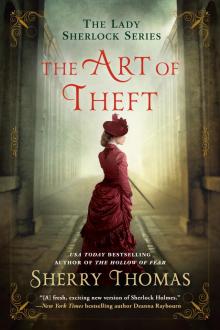 The Art of Theft
The Art of Theft The Magnolia Sword: A Ballad of Mulan
The Magnolia Sword: A Ballad of Mulan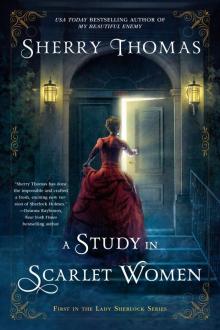 A Study In Scarlet Women
A Study In Scarlet Women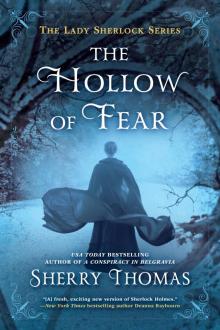 The Hollow of Fear
The Hollow of Fear The Magnolia Sword
The Magnolia Sword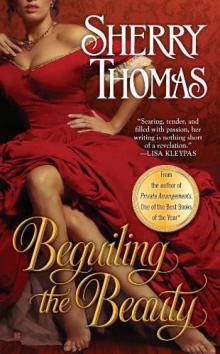 Beguiling the Beauty ft-1
Beguiling the Beauty ft-1 The Heart is a Universe
The Heart is a Universe The Hidden Blade: A Prequel to My Beautiful Enemy (Heart of Blade)
The Hidden Blade: A Prequel to My Beautiful Enemy (Heart of Blade)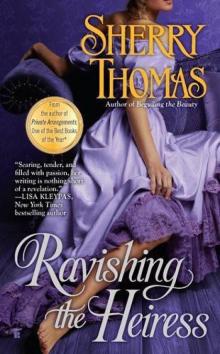 Ravishing the Heiress ft-2
Ravishing the Heiress ft-2 The Immortal Heights
The Immortal Heights The Hidden Blade
The Hidden Blade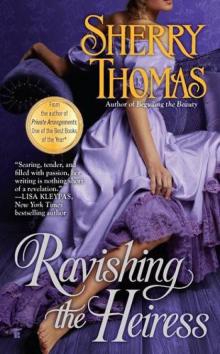 Ravishing the Heiress
Ravishing the Heiress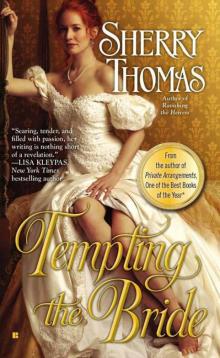 Tempting the Bride
Tempting the Bride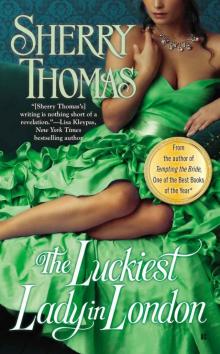 The Luckiest Lady in London
The Luckiest Lady in London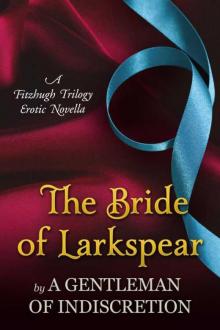 The Bride of Larkspear: A Fitzhugh Trilogy Erotic Novella
The Bride of Larkspear: A Fitzhugh Trilogy Erotic Novella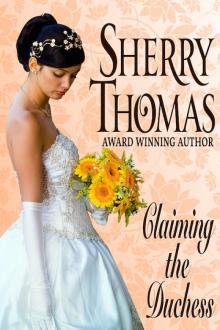 Claiming the Duchess
Claiming the Duchess The One in My Heart
The One in My Heart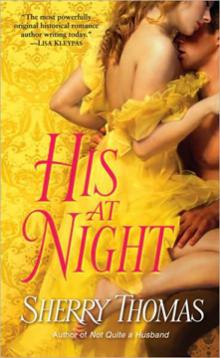 His At Night
His At Night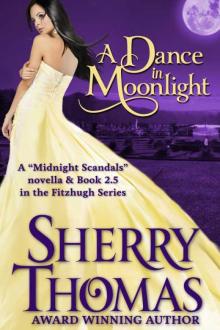 A Dance in Moonlight
A Dance in Moonlight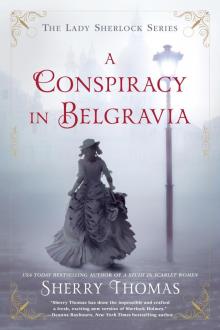 A Conspiracy in Belgravia
A Conspiracy in Belgravia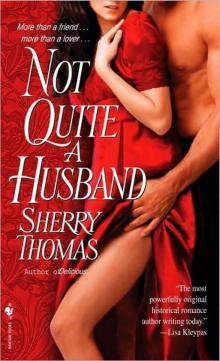 Not Quite a Husband
Not Quite a Husband